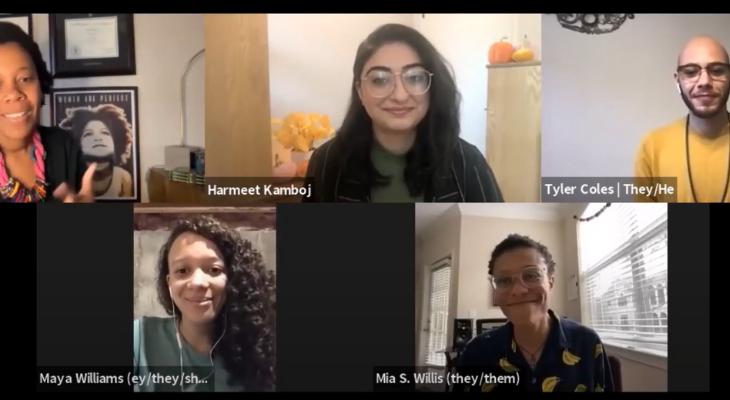On Loving the ‘Spiritual Misfits’ and Reimagining the Possible
November 19, 2021

What happens when five thoughtful leaders from different religious traditions gather in one virtual space? The answer: a mosaic of remarkable moments.
Theologian and author Rev. Jen Bailey, ordained itinerant elder in the African Methodist Episcopal Church, led the conversation, “Composting Religion: Remembering the Past, Cultivating the Future,” on November 11. Listen to the conversation here.
The event featured Maya Williams, a poet and practicing Christian; Harmeet Kaur Kamboj, a Sikh interfaith activist, dancer and educator; Buddhist spoken word artist and poet Mia S. Willis; and the Rev. Byron Tyler Coles, an ordained Unitarian Universalist minister and movement chaplain.
Bailey described them as a collection of IFYC alumni “blazing a path forward” and dreaming new things into being.
“Today’s conversation really feels like the culmination of dreams,” Bailey said, noting that she was one of the only African Americans on an IFYC youth council when she joined the interfaith movement as a high school senior. “To be able to facilitate a conversation with other IFYC alumni, all of whom are folks of color, is blowing my mind in the best way, and to be able to share the genius of these incredible, incredible humans is wonderful.”
Share
The following is a list of resources and readings shared by the participants:
- “Black Buddhists and the Body: New Approaches to Socially Engaged Buddhism” is an article by Dr. Rima Vesely-Flad. It breaks down how Black Buddhist practitioners engage racism and challenge predominantly white, affluent Buddhist sanghas that embrace the tenets of Socially Engaged Buddhism.
- “I Must Become a Menace to My Enemies” is a poem by Black American poet, essayist, and activist June Jordan; it is dedicated to Agostinho Neto, the first president of Angola.
- “Soldado así no he de ser” is a poem by Black Cuban poet, journalist, and activist Nicolás Guillén.
- “PARABLE OF THE GREAT BANQUET” is a poem by Black American poet and popular educator Mia S. Willis
- Movement Chaplaincy with Daring Compassion
- The Fire Next Time, James Baldwin
- Grieving While Black by Breeshia Wade
- OpenPathCollective.org is a free database to find affordable therapists.
- Faith in Full Color
Bailey began by reading an excerpt from her new book, “To My Beloveds: Letters on Faith, Race, Loss and Radical Hope.” This passage is a letter to “spiritual leaders on the edge”:
“I’m writing this letter to you, my fellow spiritual misfit, so that you know in no uncertain terms that you are not alone in your quest for understanding your place in the world as it is evolving. At times it may feel like the earth is literally moving under your feet as you attempt to step in one direction or the other. That’s because it is. All around us, things are shifting, systems are collapsing, and institutions are failing. This should not surprise us. Around the world, elders across cultures and people were predicting this time would come. It is a time of great uncovering in which Mother Earth and Father Sky are pushing us into a divine reckoning about what it means to be in right relationship with one another and all sentient beings in the 21st century and beyond. It is clear to me the actions we take now will have deep, irreversible consequences for the generations to come.
“The good news is, this is a time made for misfits. When you are at the center of a circle it is impossible to see what is at the perimeter, if you are even aware there is a perimeter. As misfits who are pushed to the edge and in between places, we are able to see what is on the horizon and collectively discern what is needed to meet the challenges ahead. We are called to be the gardeners who will compost and tend to the soil upon which future generations will sow seeds that will one day blossom. Those of us who are embedded within spiritual communities understand that there are rules within our religious communities that no longer serve us and fail to speak to the material conditions that shape the lives of our people. We cannot program our way out of crisis. No single curriculum will reverse the impact of climate change and poverty and heal more than four centuries of racial injustice in the United States.
“For far too long we believed the insidious lie that innovation is the domain of those with the power and social status to determine what models are worthy of our attention and praise. The enormity of the plight we face can only be solved by harnessing the ingenuity and creativity of the communities to which we belong and are accountable. The season will require us to recover ancestral wisdom and practices that we lost or undervalued, repair the deep breaches in our interpersonal and communal relationships that replicate patterns of harm and destruction, and reimagining the possible by stretching ourselves to see beyond the realities of our current circumstances and daring to dream something different into being.”



